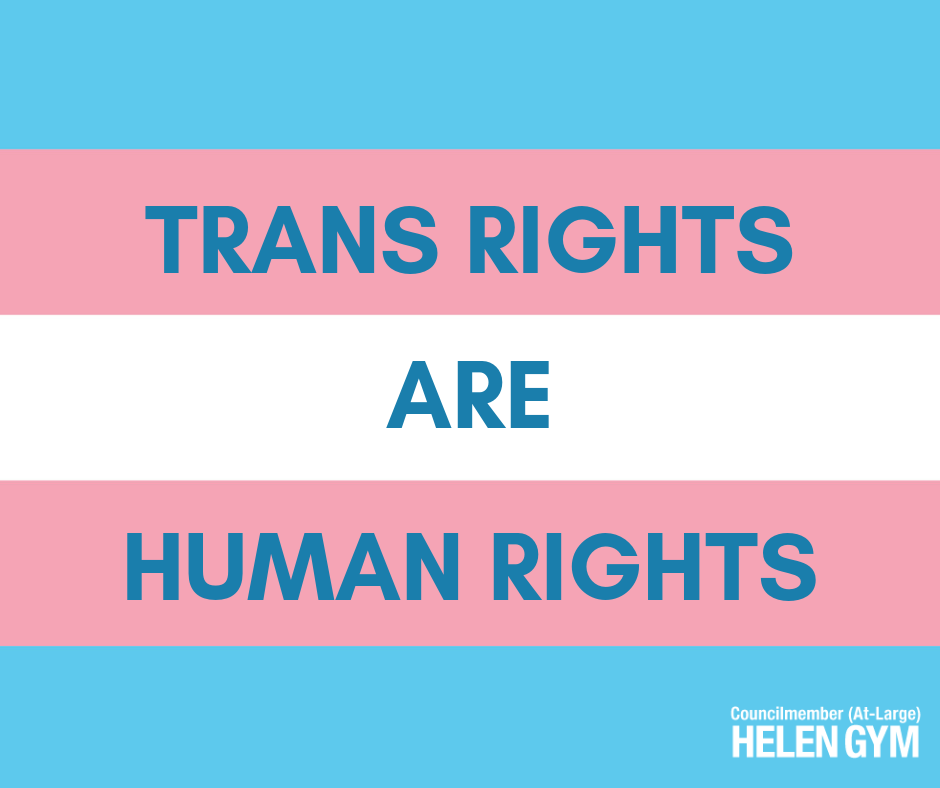Philadelphia City Council passed three bills Thursday fortifying protections for trans and nonbinary people by strengthening gender-neutral bathroom requirements, expanding anti-discrimination policies for those working with queer youth and updating language in the city’s Fair Practices Ordinance to be more inclusive.
The bills in the “inclusivity package,” introduced by Councilmember Helen Gym, are expected to be signed into law by Mayor Jim Kenney, who championed the LGBT Equality Bill that mandates City employees receive health care covering gender-affirming surgery when he served as a councilmember.
“City Council just took a big step towards making this city safe and affirming for all people,” Gym said. “For far too long, trans and nonbinary people have lived with the uncertainty that their jobs and their lives are not protected. Every Philadelphian deserves the right to live their life with dignity. Today, we move closer to that goal.”
The first bill, which is co-sponsored by Councilmembers William Greenlee, Mark Squilla and Derek Green, requires youth organizations to implement policies meeting or exceeding the standards set forth by the School District’s Policy 252 for protecting trans and nonbinary young people from discrimination. The existing measure outlines guidelines for keeping a student’s trans identity confidential, evaluating when activities can appropriately be gender-segregated, using gender-inclusive language and more.
Gym’s new bill also requires regular training for staff working with youth on how to properly execute the non-discrimination policies.
Linda Hawkins and Nadia Dowshen, co-directors of the Sexuality Development Clinic at Children’s Hospital of Philadelphia, said in a statement that many of the more than 1,300 trans and gender-diverse young people they have worked with experienced bullying.
“When we work with patients, families, and school staff to ensure a better environment for transgender youth in our clinic, and youth can then go to school and learn rather than feeling excluded or discriminated against, we see positive impacts on their health and well-being,” they added.
A 2018 LGBTQ Youth Report by the Human Rights Campaign found 26 percent of LGBTQ teenagers reported always feeling safe in school, while 5 percent said all of their teachers and school staff supported their identities.
Gym’s second bill, No. 190559, requires a gender-inclusive bathroom on each floor of City Hall. It also calls for the Department of Public Property to file annual reports listing new renovation and construction projects and the number and location of corresponding gender-inclusive restrooms. The policy builds on Kenney’s 2013 equality legislation, which stipulated that new City buildings include gender-inclusive facilities.
The final LGBTQ-focused bill passed by council last week, No. 190651, revises the definitions of “gender identity” and “sexual orientation” in The Philadelphia Code. The new definitions read:
- Gender identity – An individual’s internal sense of gender, or one’s gender as perceived by others, that may or may not align with one’s physical anatomy, chromosomal sex, or sex assigned at birth. Examples include, but are not limited to, man, woman, non-binary, genderfluid, and agender.
- Sexual orientation – An individual’s romantic, physical, sexual, or emotional attraction to others, or a lack of attraction to others, by preference, practice, or as perceived by others. Examples include, but are not limited to, heterosexual, bisexual, gay, lesbian, and pansexual.
City Council’s rulings come on the heels of a September public hearing held by the body’s Law and Government Committee. There, local LGBTQ leaders like Rue Landau, executive director of the Philadelphia Commission on Human Relations; Evan Thornburg, deputy director of the Mayor’s Office of LGBT Affairs; and Naiymah Sanchez, trans justice coordinator of the ACLU of Pennsylvania, provided supportive testimony for the bills.
“There is a need to protect marginalized Philadelphians,” Sanchez said. “Passing bills like these should be a priority, as a city lacking these protections through policy only causes further trauma to a community already oppressed.”
